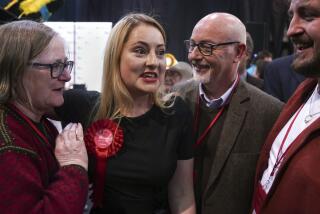At Labor Party conference, Brown implores Britain to ‘dream big’
- Share via
LONDON — British Prime Minister Gordon Brown, his Labor Party at risk of losing elections next year after more than a decade in power, sought Tuesday to win over moderate voters and rally supporters with promises of reform and a plea to “dream big.”
Speaking at the last major Labor Party conference before the balloting, Brown promised to press for new laws and efforts to fight political and financial corruption, improve healthcare for cancer patients and the elderly and increase spending on education, policing, international development and climate change studies.
He sought to present Labor as a caring party that offered “the change that benefits the hardworking majority, not the privileged few.”
Using the German poet Goethe as inspiration, the prime minister called on supporters to “dream not small dreams because they cannot change the world. Dream big dreams and then watch our country soar.”
His speech came amid the sinking fortunes of his party, which has governed Britain since 1997, for most of that time under the leadership of former Prime Minister Tony Blair.
Brown took over the post two years ago and has struggled against an economic downturn and public anger over financial scandals involving politicians from his and other parties.
The rival Conservative Party leads the latest Ipsos poll, with support from 36% of respondents.
Labor earned its lowest rating since the early 1980s, with 24% -- one percentage point behind the Liberal Democratic Party.
But in his hourlong speech, Brown declared that Labor is the party of “fighters and believers who change the world; we have changed the world before and we are going to do it again.”
He pledged to “protect and improve front-line services,” such as providing 10 hours of free child care a week for 250,000 2-year-olds from families “on modest or middle incomes,” a program paid for by scrapping tax relief for better-off families.
And in an apparent bid to win over moderate voters, he vowed to battle street criminals but also criticized overspending and corruption among officials and promised to curtail excessive compensation for bankers.
“We will pass a new law to intervene on bankers’ bonuses whenever they put the economy at risk,” Brown said. “And any director of any of our banks who is negligent will be disqualified from holding any such post.”
His address drew mixed reactions outside the Labor conference hall.
Derek Simpson, joint general secretary of Unite, Britain’s biggest trade union, told the Guardian newspaper: “He answered a number of points we were concerned about. . . . Let’s put it this way: Nobody is going to change him for the leadership and he will be prime minister after the next general election.”
But Conservative Party Chairman Eric Pickles told the BBC, “This was a speech with no vision and no argument, just a long shopping list with no price tag.”
Political analyst Tony Travers of the London School of Economics said in a telephone interview:
“The problem facing a party that has been in power for 12 years is that it has to convince the electorate that it is the party of change. He will have enthused the party a bit, but I don’t think there is more than a perfectly respectable attack on the opponents.
“It does not signal a brave new direction.”
More to Read
Sign up for Essential California
The most important California stories and recommendations in your inbox every morning.
You may occasionally receive promotional content from the Los Angeles Times.










